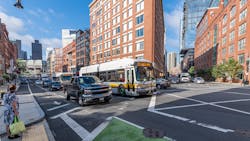MBTA partners with local municipalities to construct nearly five miles of bus lanes, other transit upgrades
Nearly five miles of bus lanes, along with other transit infrastructure upgrades, will be constructed this summer across the Metro Boston region to improve bus speed and reliability.
The projects will be constructed by the Massachusetts Bay Transportation Authority (MBTA), the Massachusetts Department of Transportation (MassDOT), the city of Boston, the city of Somerville, the city of Malden, the town of Brookline, the city of Revere and the city of Lynn.
These quick-build projects aim to address transit delays on some of the region’s most congested roadways in order to improve bus travel time and reliability and move more people more efficiently to support economic recovery and public health.
These projects are a part of the MBTA’s Better Bus Project and Transit Priority effort, a major initiative to improve bus service and the system as a whole. Several of the projects received funding through the Baker-Polito Administration’s Shared Winter Streets and Spaces grant program, which aims to improve traffic and transit conditions in support of public health, safe mobility and renewed commerce across the commonwealth.
“These are precisely the kinds of projects the Baker-Polito Administration had in mind in awarding municipalities Shared Winter Streets and Spaces funding for public transportation needs as we emerge from the pandemic,” said Acting Transportation Secretary and CEO Jamey L. Tesler. “We are grateful to municipal leaders in Boston, Somerville, Malden, Brookline, Revere and Lynn for collaborating with the MBTA to install infrastructure, including dedicated bus lanes, and having the vision to see that ‘shared streets’ are streets which are truly vital to helping residents move around safely and to encouraging people to get around in ways other than in a personal motor vehicle.”
“Throughout the pandemic, the bus system has been a lifeline for riders accessing jobs, healthcare, and services,” said MBTA General Manager Steve Poftak. “Since spring 2020, we have worked with our municipal partners to deliver an additional nearly five miles of bus lanes, benefiting over 57,000 riders in some of the region’s hardest-hit communities. These projects are testimonies to our shared commitments to advancing equitable mobility, and why we want to deliver another nearly five miles of infrastructure this year. These projects would not have been possible without the tireless work of our municipal partners.”
MBTA says these projects are another important step that contributes to the regional effort to advance bus priority on local streets. Bus lanes in the town of Brookline and the city of Revere will be the first bus priority facilities to be constructed in those municipalities, bringing the total number of metropolitan area communities with bus lanes on local streets to nine.
“Our bus lane on Broadway is a part of our city’s commitment to improve mobility, especially for local residents who depend on public transit to get to work, school and essential services,” said Revere Mayor Brian M. Arrigo. “The way we rebuild our region in the wake of this crisis is by recommitting to the public goods that serve our residents every day.”
Other projects in cities including Lynn, Malden and Somerville will build on recently completed adjacent projects, further building a network of bus priority facilities in communities that have seen durable transit ridership throughout the pandemic.
“The bus lanes coming to Western Ave., in tandem with the recent bus and bike improvements added to North Common, South Common and Market Street will greatly aid Lynn residents’ ability to travel around their city while providing them better access to opportunities around the region,” said Lynn Mayor Thomas M. McGee. “We appreciate our close partnership with the MBTA and MassDOT to move this project forward to implementation and are thankful the support of our local partners at GE.”
Building on the success of the Shared Streets and Spaces Municipal Grant Program first launched during the summer of 2020–and later extended to address the particular challenges of winter–MassDOT is now announcing a new phase of the program. The new phase will operate similarly to previous iterations of the Shared Streets and Spaces Program by supporting municipalities and transit authorities to improve plazas, sidewalks, curbs, streets, bus stops, parking areas and other public spaces in support of public health, safe mobility and renewed commerce.
In light of recent increases in speeding-related crashes and fatalities, this new phase of the program will have an additional emphasis on safety and aims to fund projects that improve safety for all road users through interventions that achieve safer conditions and safer speeds.
